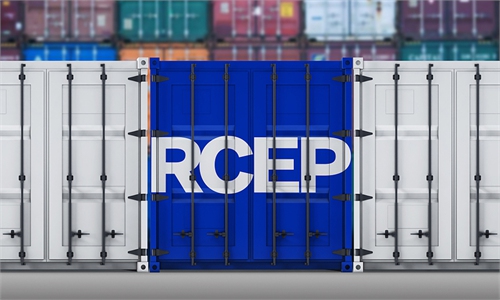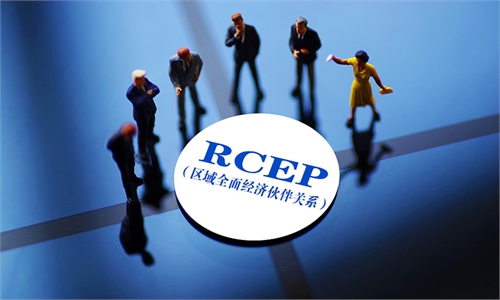
Illustration: Xia Qing/Global Times
At a time when the US is ramping up tech decoupling, a high-level forum, gathering government officials and business leaders from 15 RCEP participating countries, is scheduled to be held in China from Wednesday to Friday, aiming at promoting regional economic integration and bringing Asia-Pacific countries closer to their development goals. Amid headwinds brought about by the rise of trade protectionism, the gathering reflects the attractiveness and economic cohesion of free trade.China has been a strong advocate of free trade, and also the first non-ASEAN participating country to complete the ratification process of RECP. The trade deal came into force in the Philippines on June 2, meaning the world's largest free trade pact is now in effect for all its 15 members. This year's gathering will be the first high-level forum for RCEP economic and trade cooperation after the deal entered into force, and therefore attracts attention as people focus on how the RCEP agreement will develop in the future.
Asia-Pacific economies share strong economic complementarity. However, it is undeniable that many Asia-Pacific countries are export-oriented economies with homogenized competition in their industrial and supply chains. What's worse, amid global economic uncertainty caused by sluggish demand, some Western countries, especially the US, increasingly resort to trade protectionism to insulate its own producers. At present, the world economy is at a crossroads amid Washington's "decoupling" or "de-risking" calls. How will Asia-Pacific economies run against a strong headwind of trade protectionism? This is a question that RCEP member countries need to answer.
The RCEP agreement has entered into force, paving the way for lower import taxes for goods from all RCEP-participating countries. It's not the end. It's just the beginning. Following the full implementation of the RCEP, Asia-Pacific countries need continuous impetus for further integration. Media reports said discussion topics at the high-level forum will include economic integration in the Asia-Pacific region, facilitation of international shipping and trade, integration of industrial chains within the region, and new opportunities for digital economy and green economy. It has proved that economic cooperation in the Asia-Pacific region will not stop amid the de-globalization and decoupling headwinds, and will go further in nearly every area.
Asia is the world's most dynamic region. Like China, other RCEP member countries' primary strategy is to promote economic and social development. The US and Europe are traditional import markets for export-oriented economies in the Asia-Pacific region, but now, the outlook for external demand is mixed at best, and this has forced Asia-Pacific economies to seek new market opportunities internally within the region.
In 2022, China's trade with other RCEP member countries reached 12.95 trillion yuan ($1.92 trillion), up 7.5 percent year-on-year and accounting for 30.8 percent of China's total foreign trade. That means China has been an important import market for RCEP members. The RCEP aims to ultimately eliminate tariffs on over 90 percent of goods traded within the bloc in the future. A wider range of products can enjoy zero-tariff access to share the dividends of China's economic growth.
The RCEP pact is set to enormously boost goods trade, and some analysts predict that the next step is to further foster wider market access in services of finance, transportation and tourism. There is a consensus that a financial system which is stable across jurisdictions can foster financial integration, but it is not an easy task.
China and ASEAN convened the third round of the ASEAN-China FTA 3.0 upgrade negotiations from Saturday to Tuesday in Kunming, China. Those trade negotiations will contribute to the continuous advancement of RCEP.
Effort in the West to "de-risk" their economies is a false proposition. What Asia-Pacific economies need is cooperation, not de-risking.
The author is a reporter with the Global Times. bizopinion@globaltimes.com.cn


